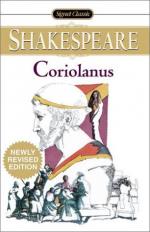|
This section contains 9,063 words (approx. 31 pages at 300 words per page) |

|
SOURCE: “Tragic Superfluity in Coriolanus,” in ELH, Vol. 50, No. 3, Autumn, 1983, pp. 485-507.
In the essay that follows, Holstun discusses the genre of Coriolanus, and considers the play’s relation to both tragedy and comedy.
Shakespearean drama provides the history of ideas with no better exposition of the classical, medieval, and Renaissance metaphor of the body politic than Menenius' fable of the belly in the first scene of Coriolanus.1 It is quite possible to put oneself in the position in which Menenius would put the Roman plebeians, taking his organic analogy for a dramatic as well as a political exemplum, and to read Coriolanus as the tragic failure of the Roman state to live up to its own organic ideal. In The State in Shakespeare's Greek and Roman Plays, James E. Phillips, Jr. writes, “If … we take Menenius's speech on the belly as a key to the political structure...
|
This section contains 9,063 words (approx. 31 pages at 300 words per page) |

|


